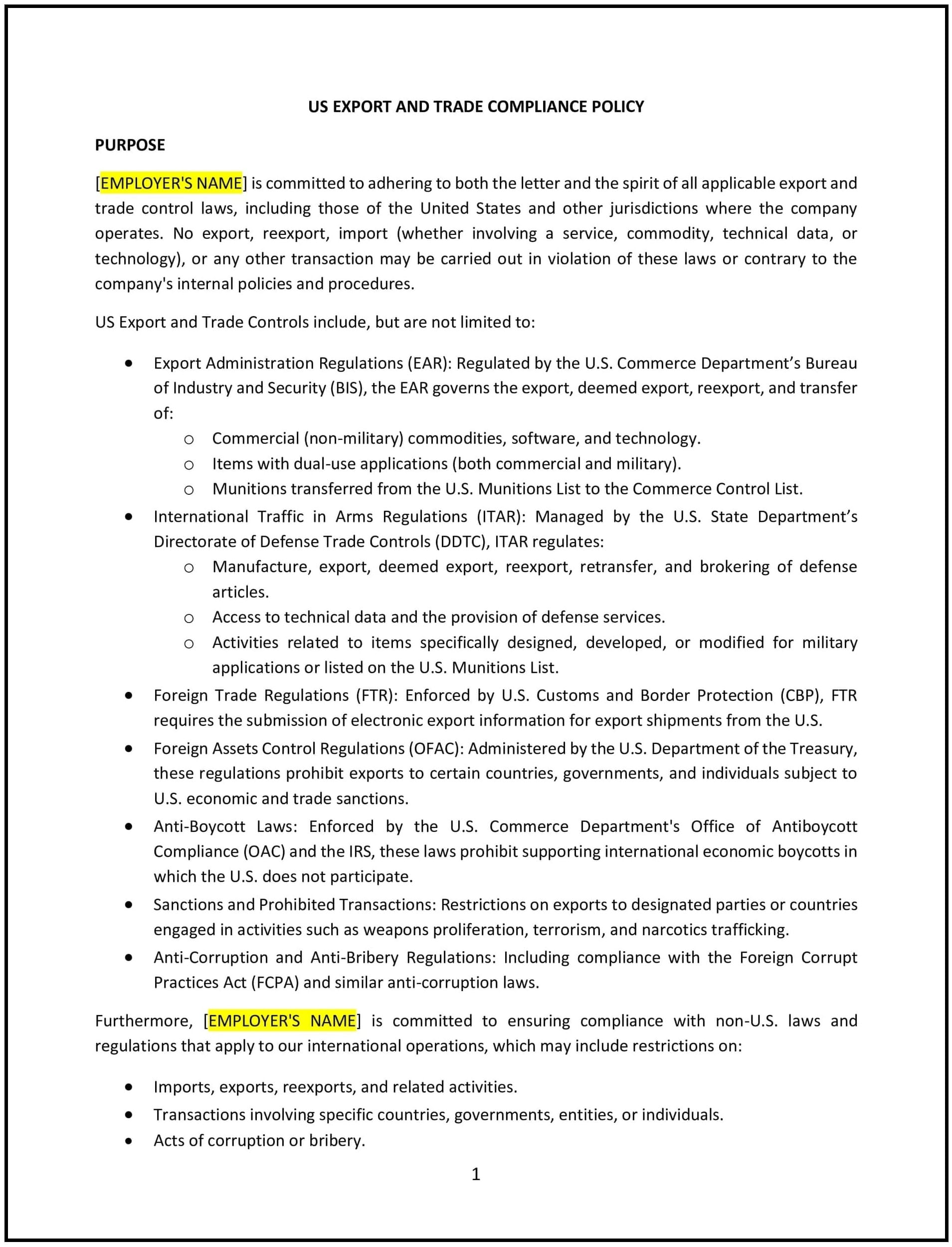US export and trade compliance policy (Maine): Free template
Got contracts to review? While you're here for policies, let Cobrief make contract review effortless—start your free review now.

Customize this template for free
US export and trade compliance policy (Maine): Free template
This US export and trade compliance policy is designed to help Maine businesses comply with U.S. export control laws and regulations, including the Export Administration Regulations (EAR), the International Traffic in Arms Regulations (ITAR), and other applicable trade laws. It outlines the responsibilities of employees in ensuring compliance when exporting goods, services, or technology, as well as the procedures for managing and monitoring trade compliance activities.
By implementing this policy, Maine businesses can mitigate the risk of violating export control laws, ensure ethical business practices, and maintain a solid reputation in the global market.
How to use this US export and trade compliance policy (Maine)
- Define scope: Clearly define the types of transactions and activities that are subject to export control laws, including the export of goods, services, software, and technology, as well as interactions with foreign entities or governments.
- Outline compliance responsibilities: Specify the responsibilities of employees involved in export activities, including those in sales, marketing, shipping, procurement, and other roles that may handle export transactions.
- Address export licensing: Detail the requirements for obtaining export licenses for controlled goods, services, or technology, including the process for applying for licenses and determining if one is needed for a specific export.
- Identify prohibited parties and destinations: List countries, entities, or individuals that are prohibited from receiving exports under U.S. law, including sanctions and embargoes imposed by the U.S. government.
- Implement monitoring and reporting: Establish procedures for monitoring export transactions, ensuring that they comply with the policy, and reporting any suspicious activity or potential violations to the designated compliance officer or legal team.
- Address recordkeeping requirements: Specify the recordkeeping requirements for export transactions, including maintaining accurate records of shipments, licenses, and related documentation for the required period.
- Conduct employee training: Ensure that employees receive regular training on export and trade compliance, including updates on relevant laws and regulations.
- Review regularly: Update the policy periodically to reflect changes in U.S. export control laws, international trade agreements, or business practices.
Benefits of using this US export and trade compliance policy (Maine)
Implementing this policy provides several benefits for Maine businesses:
- Mitigates legal risks: Helps ensure compliance with U.S. export control laws, reducing the risk of penalties, fines, and legal action for violations.
- Promotes ethical business practices: Encourages responsible and transparent trade practices, preventing the business from engaging in transactions that may violate U.S. law or international sanctions.
- Enhances business credibility: Demonstrates the company’s commitment to adhering to international trade regulations and ethical standards, enhancing its reputation with customers, partners, and regulators.
- Improves operational efficiency: Establishes clear guidelines and procedures for managing export activities, streamlining compliance efforts and improving internal controls.
- Protects national security: Contributes to U.S. national security efforts by ensuring that sensitive technology and goods are not exported to prohibited entities or countries.
Tips for using this US export and trade compliance policy (Maine)
- Communicate the policy: Ensure that all employees involved in export activities are familiar with the policy and understand their responsibilities for maintaining compliance.
- Designate a compliance officer: Appoint a designated compliance officer or team to oversee export and trade compliance efforts, manage license applications, and monitor compliance across the organization.
- Regularly audit transactions: Perform periodic audits of export transactions to ensure compliance with U.S. export laws, licensing requirements, and recordkeeping practices.
- Stay updated on regulations: Monitor updates to U.S. export control laws, sanctions, and international trade agreements to ensure the policy remains compliant with current regulations.
- Provide ongoing training: Offer regular training sessions to employees involved in export activities, ensuring they are aware of changes to export laws and the company’s compliance procedures.
- Establish reporting mechanisms: Create clear reporting channels for employees to report potential violations or concerns about export transactions, ensuring that issues are addressed promptly and thoroughly.